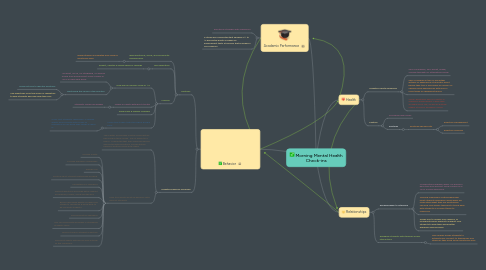
1. Academic Performance
1.1. Emotional Struggle with academics
1.2. A study was conducted that showed a 11 to 17 percentile points increase on achievement tests at schools that provided a SEL program.
2. Behavior
2.1. Routines
2.1.1. Build emotional, social, and community building skills.
2.1.1.1. Builds stamina in Empathy and Social & Emotional Skills.
2.1.2. Self Regulation
2.1.2.1. Reflect, Identify & being aware of feelings
2.1.3. Process
2.1.3.1. How are you doing? Scale of 1-5
2.1.3.1.1. I'm great, I'm ok, I'm struggling, I'm having a hard time and wouldn't mind a check in. I'm in a really dark place.
2.1.3.1.2. Identifying the cause of the emotion
2.1.3.2. Check in Charts with post it notes
2.1.3.2.1. Students' names are hidden
2.1.3.3. Show Daily & Weekly Changes
2.1.3.4. Collecting student data through a google form.
2.1.3.4.1. Color coat students' responses in google sheets and correlate with zones of regulation so you know who needs a check in.
2.2. Negative behavior observed
2.2.1. The Center for Disease Control & Prevention had conducted a survey. 10% of parents of kids 5-17 reported that their child had severe difficulties with emotions, concentration behavior getting along with others.
2.2.2. How to promote positive behavior with difficult students
2.2.2.1. Provide Safety
2.2.2.2. Provide academic challenges.
2.2.2.3. Provide Joy
2.2.2.4. Positive adult-student relationship building.
2.2.2.5. Consistency in discipline
2.2.2.6. Watch transitions & provide extra support for specials, recess, lunch and the bus.
2.2.2.7. Build schoolwide habits of observing students, recognize & know how to de-escalate students.
2.2.2.8. Provide positive feedback
2.2.2.9. Aim for incremental progress in struggling students' work.
2.2.2.10. Build in time for student reflection
2.2.2.11. Provide students with social skills outside of the classroom.
3. Health
3.1. Negative Health Observed
3.1.1. Self-Confidence, Self-Doubt, Image, Suicidal thoughts or attempted suicide
3.1.2. 26% of children in the US will either witness or experience a traumatic event before they turn 4 and nearly 35 million US children have experiences with one or more types of childhood trauma.
3.1.3. Social-Emotional skills is a factor in academic achievement. Those who struggle are at risk, as well as putting others at risk for academic failure.
3.2. Positive
3.2.1. Providing Safe Places
3.2.2. Routines
3.2.2.1. Routines add security
3.2.2.1.1. Effective Management
3.2.2.1.2. Effective Learning
4. Relationships
4.1. Knowing when to intervene
4.1.1. Conversations happen when: I'm having a hard time and wouldn't mind a check in or I'm in a really dark place.
4.1.2. Forming meaningful relationships help meet students individual needs when we understand what they are emotionally carrying. This allows teachers to touch base with students or connect them to resources.
4.1.3. Allows you to modify your lessons, or incorporate brain breaks to support your students to help them have better academic performance.
4.2. Engaging Students with teacher & peer interactions
4.2.1. Safe spaces allows students to authentically connect to themselves and others as they build social-emotional skills.
